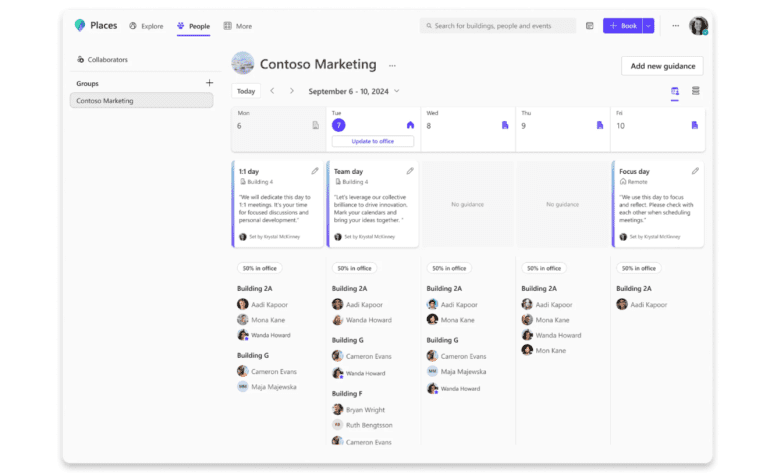- Microsoft introduces Microsoft Places, an AI-powered solution for office coordination.
- The app integrates with Outlook and Microsoft Teams, facilitating seamless scheduling and collaboration.
- Features include a dedicated location plan section, priority day settings, and integration with Copilot for schedule optimization.
- Microsoft Places streamlines booking meeting rooms and desks, with end-to-end functionality accessible through Outlook and Copilot.
- Integration with Microsoft 365 apps enhances workplace visibility and enables real-time collaboration.
- Microsoft Places will be part of Microsoft Teams Premium, offering advanced features at a promotional price.
Main AI News:
Microsoft’s latest innovation, Microsoft Places, harnesses the power of AI to streamline office coordination, addressing the challenges brought about by the rise of hybrid work models in the wake of the COVID-19 pandemic. This innovative solution integrates seamlessly with Outlook and Microsoft Teams, empowering businesses to optimize in-office time effectively.
In a recent blog post, Jared Spataro, Microsoft’s corporate vice president of AI at work, highlighted the significance of face-to-face interactions in the workplace. He emphasized the importance of avoiding empty desks and fostering collaboration among colleagues. With Places, businesses can effortlessly synchronize office schedules, ensuring employees have the opportunity for meaningful interactions with managers and peers.
The core feature of Microsoft Places is its dedicated location plan section, enabling users to establish and share their office days while staying informed about their colleagues’ availability. Managers have the flexibility to designate priority days for in-office activities, facilitating seamless coordination for important events or team gatherings. This location data seamlessly integrates with Outlook calendars, providing users with visibility into office events and their planned office visits.
Looking ahead, Microsoft envisions a deeper integration of Places with Microsoft Copilot, their AI assistant. Users will have the ability to seek recommendations on the best days to be in the office based on factors like scheduled meetings and team availability. Moreover, Copilot can dynamically adjust schedules, optimizing work locations and rescheduling meetings accordingly.
Furthermore, Microsoft Places introduces a convenient finder feature for booking meeting rooms and desks, directly accessible through Outlook. Users receive timely reminders in their calendars to book spaces for their in-office days, ensuring a hassle-free experience. This end-to-end booking functionality will extend to Copilot, automating the process of finding and reserving meeting spaces.
The impact of Microsoft Places extends beyond individual productivity, as it integrates with various Microsoft 365 applications. In Microsoft Teams, users can identify nearby colleagues in the office, facilitating spontaneous conversations or lunch arrangements. Additionally, real estate and facilities management teams will benefit from space analytics, gaining insights into building utilization and peak occupancy days.
Microsoft Places will soon become an integral part of Microsoft Teams Premium, offering enhanced features at a promotional price. With its AI-driven capabilities, including intelligent recap and watermarking, Teams Premium empowers organizations to elevate collaboration and productivity in the modern workplace.
Conclusion:
The introduction of Microsoft Places signifies a paradigm shift in office coordination, leveraging AI to enhance productivity and collaboration in hybrid work environments. Businesses embracing this technology stand to benefit from streamlined scheduling, improved utilization of office spaces, and enhanced employee engagement, ultimately driving organizational success in the evolving market landscape.

